Abstract
Modern philosophical accounts of causality deviate dramatically from medieval accounts, yet many of the views held in the seventeenth and eighteenth centuries represent the end of an evolutionary process that began in the thirteenth century with the reintroduction of Aristotelian natural philosophy to medieval authors. The entry traces the evolution from premodern to modern views, explaining the transition that occurred from early medieval authors through late medieval scholastics. The crucial turning point is the tendency to distinguish explanatory principles from causes properly conceived. That tendency in turn corresponds to a critique of final causes in nature. The crucial change that occurred in the seventeenth century, however, was due less to a change in causal conceptions and more to implications of mechanical philosophy for commonsense inferences about nature and causal relations.
Access this chapter
Tax calculation will be finalised at checkout
Purchases are for personal use only
Similar content being viewed by others
Bibliography
Primary Sources
Albert the Great. (1890). Physicorum libri. In A. Borgnet (Ed.), Opera omnia (Vol. 3). Paris: Ludovicus Vivès.
Albert the Great. (1971). De caelo et mundo. In B. Geyer (Ed.), Opera omnia (Vol. 5). Münster: Aschendorff.
Albert the Great. (1987–1993). Physica. Pars I. Libri 1–4, Pars II. Libri 5–8 (ed.: Hossfeld, P.). Münster: Aschendorf.
Anselm of Canterbury. (1998). The major works (ed. and trans: Davies, B., Evans, G. R.). Oxford: Oxford University Press.
Aristotle. (1939). On the heavens (trans: Guthrie, W. K. C.). Cambridge: Harvard University Press.
Aristotle. (1941a). Analytica posteriora (trans: Mure, G. R. G.). In R. McKeon (Ed.), The basic works of Aristotle. New York: Random House.
Aristotle. (1941b). Metaphysica (trans: Ross, W. D.). In R. McKeon (Ed.), The basic works of Aristotle. New York: Random House.
Aristotle. (1957–1990). Physica. In Aristoteles Latinus (Vol. 7). Translatio Vetus, ed.: Bossier, F., Brams, J.; Translatio Vaticana, ed.: Mansion, A. Leiden: Brill.
Aristotle. (1968–1970). Physics, 2 vols (trans: Wickstead, P. H., Cornford, F. M.). Cambridge: Harvard University Press.
Eriugena, J. S. (1987). Periphyseon (trans: Williams, I. S., O’Meara, J.). Montreal: Bellarmin.
Thomas, A. (1963a). Commentary on Aristotle’s Physics (trans: Blackwell, R., et al.). New Haven: Yale University Press.
Thomas, A. (1963b). Exposition of Aristotle’s treatise on the heavens, books I–III, 2 vols (trans: Larcher, R., Conway, P.). College of St. Columbus: Mary of the Springs.
William of Ockham. (1985). Expositio in octo libros Physicorum. Opera philosophica (Vol. 4, ed.: Richter, V., Leibold, G.); (Vol. 5, ed.: Wood, R., et al.). St. Bonaventure: The Franciscan Institute.
William of Ockham. (2007). Demonstration and scientific knowledge (trans: Longeway, J.). Notre Dame: University of Notre Dame.
Secondary Sources
Adams, M. (1987). William Ockham (Vol. 2). Notre Dame: University of Notre Dame.
Bodnár, I. (1997). Movers and elemental motions in Aristotle. Oxford Studies in Ancient Philosophy, 15, 81–117.
Bos, E. P., & Meijer, P. A. (Eds.). (1992). On Proclus and his influence in medieval philosophy. Leiden: Brill.
Fakhry, M. (1958). Islamic occasionalism and its critique by Averroes and Aquinas. London: Unwin and Unwin.
Falcon, A. (2005). Aristotle and the uniformity of nature: Unity without uniformity. Cambridge: Cambridge University Press.
Funkenstein, A. (1965). Heilsplan und natürliche Entwicklung. Munich: Nymphenburger Verlagshandlung.
Goddu, A. (1981). The contribution of Albertus Magnus to discussions of natural and violent motions. In: Albert der Grosse, Seine Zeit, Sein Werk, Seine Wirkung. Miscellanea Mediaevalia (Vol. 14, pp. 116–125). Berlin and New York: Walter de Gruyter.
Goddu, A. (1984). The physics of William of Ockham. Leiden: Brill.
Goddu, A. (1999). Ockham’s philosophy of nature. In P. Spade (Ed.), The Cambridge companion to Ockham (pp. 143–167). Cambridge: Cambridge University Press.
Lennox, J. (1986). Aristotle, Galileo, and mixed sciences. In W. Wallace (Ed.), Reinterpreting Galileo (pp. 29–51). Washington, DC: The Catholic University Press of America.
Longeway, J. (2007). Introduction. In William of Ockham (Ed.), Demonstration and scientific knowledge in William of Ockham (pp. 1–140). Notre Dame: University of Notre Dame.
Markus, R. A. (Ed.). (1972). Augustine: A collection of critical essays. Garden City: Anchor Books.
Marmura, M. (1965). Ghazali and demonstrative science. Journal of the History of Philosophy, 3, 183–204.
Matthews, G. (Ed.). (1999). The Augustinian tradition. Berkeley: University of California Press.
McDowell, J., & Williams, T. (2003). In search of certainty. Wheaton: Tyndale House.
Moran, D. (1989). The philosophy of John Scottus Eriugena, a study of idealism in the middle ages. Cambridge: Cambridge University Press.
Noone, T. (1999). The Franciscans and epistemology: Reflections on the roles of Bonaventure and Scotus. In R. Houser (Ed.), Medieval masters, essays in honor of Msgr (pp. 63–90). Houston: E. A. Synan. University of St. Thomas.
Palmieri, P. (2008). Reenacting Galileo’s experiments. Rediscovering the techniques of seventeenth-century science. Lewiston: The Edwin Mellen Press.
Taylor, R. (1963). Causation. The Monist, 47, 287–313.
Thijssen, J. M. M. H. (1987). John Buridan and Nicholas of Autrecourt on causality and induction. Traditio, 43, 237–255.
Weisheipl, J. (Ed.). (1980). Albertus Magnus and the sciences: Commemorative essays 1980. Toronto: Pontifical Institute of Medieval Studies.
Weisheipl, J. (1985). In W. Carroll (Ed.), Nature and motion in the middle ages. Washington, DC: Catholic University of America.
Author information
Authors and Affiliations
Corresponding author
Editor information
Editors and Affiliations
Rights and permissions
Copyright information
© 2020 Springer Nature B.V.
About this entry
Cite this entry
Goddu, A. (2020). Causality. In: Lagerlund, H. (eds) Encyclopedia of Medieval Philosophy. Springer, Dordrecht. https://doi.org/10.1007/978-94-024-1665-7_118
Download citation
DOI: https://doi.org/10.1007/978-94-024-1665-7_118
Published:
Publisher Name: Springer, Dordrecht
Print ISBN: 978-94-024-1663-3
Online ISBN: 978-94-024-1665-7
eBook Packages: Religion and PhilosophyReference Module Humanities and Social SciencesReference Module Humanities




